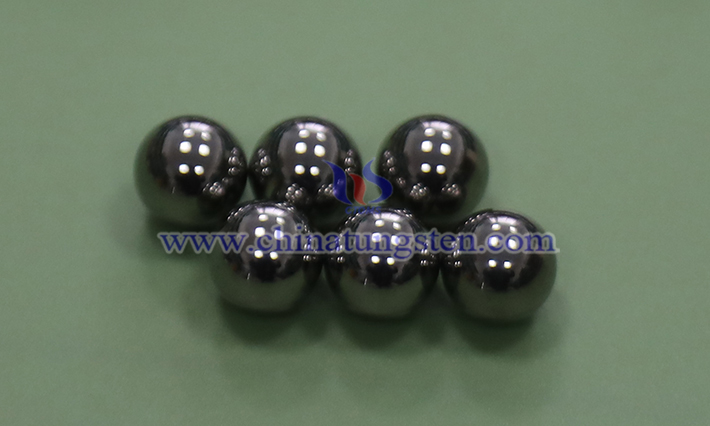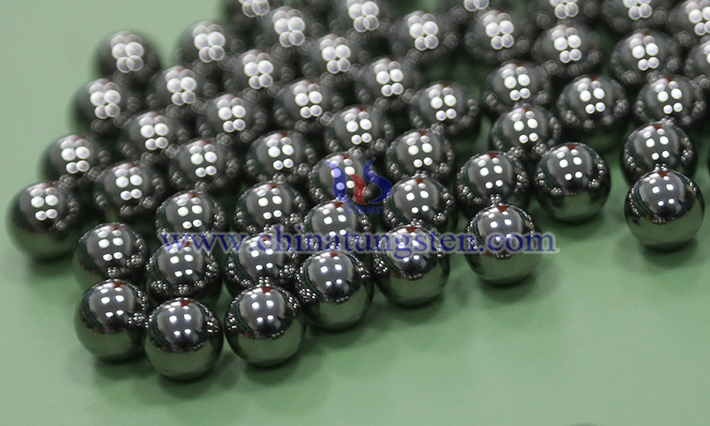Tolerance Requirements for Tungsten Cemented Carbide Balls
- Details
- Category: Tungsten Information
- Published on Friday, 12 September 2025 16:53
The tolerance requirements for tungsten cemented carbide balls typically vary depending on the application, industry standards, and manufacturing process. The following are some common requirements and explanations for tungsten cemented carbide ball tolerances, based on international or industry standards (such as ISO, DIN, ANSI, etc.) and typical application scenarios:
1. Tolerance Grades for tungsten Cemented Carbide Balls
The tolerances for tungsten cemented carbide balls are typically categorized into different grades according to international standards (such as ISO 3290 or AFBMA). Common grades include G3, G5, G10, G25, G50, and G100. The smaller the number, the tighter the tolerance and the higher the precision.
1. Diameter Tolerance: The allowable deviation in the sphere diameter, typically measured in μm. The typical range is ±0.001 mm to ±0.01 mm, depending on the precision grade. 2. Sphericity Error: The maximum deviation of a sphere's surface from an ideal spherical shape, measured in μm. High-precision tungsten cemented carbide balls can achieve tolerances below 0.1 μm.
3. Surface Roughness (Ra): A Ra of 0.05–0.2 μm is generally required to ensure wear resistance and sealing.
4. Other factors, such as roundness error and batch diameter variation, refer to the G grades of ISO 3290 (G3 to G1000, with lower numbers indicating higher precision).

II. Common Tolerance Standards
1. ISO 3290: International standard for rolling bearing steel balls, applicable to high-precision tungsten cemented carbide balls. It defines diameter tolerances, sphericity, surface quality, and other specifications.
2. AFBMA: American standard, similar to ISO, but more common in the US market. Tolerance grades differ slightly from ISO.
3. DIN 5401: German standard, applicable to precision bearings and similar applications. 4. JIS B 1501: Japanese standard, with tolerance requirements close to ISO.
4. GB/T 308-2002: Chinese standard, applicable to steel balls for rolling bearings, but also extended to tungsten cemented carbide balls.
III. Tolerance Requirements for tungsten Cemented Carbide Balls in Specific Applications
1. Precision bearings: Typically require G3 or G5 grades, with extremely tight tolerances, diameter deviations within ±0.0003 to ±0.0005 mm, and sphericity deviations within 0.0003 mm.
2. Valves and seals: Depending on pressure and sealing requirements, grades G10 to G25 may be used, with tolerances within ±0.001 to ±0.0025 mm.
3. Measuring instruments: For example, gauges or calibration equipment may require G3 or higher accuracy, with extremely high surface finish requirements.
4. Abrasive media: Tungsten cemented carbide balls used for grinding or polishing, for example, have relatively loose tolerances and may use G50 or G100.

IV. The Impact of Material Properties on Tolerances
Cemented carbide (such as WC-Co) offers high hardness, high wear resistance, and corrosion resistance. However, the sintering, grinding, and polishing processes involved in its manufacturing process can affect final tolerances. High-quality tungsten cemented carbide balls typically require multiple precision grinding and testing steps to ensure they meet specified tolerances.
V. Inspection Methods
Diameter Measurement: Use a high-precision micrometer or laser measuring equipment.
Sphericity Inspection: Measure using a roundness tester or optical inspection system.
Surface Quality: Check using a microscope or surface roughness tester.
CTIA GROUP LTD and its parent company have been dedicated to the tungsten and molybdenum products industry for nearly 30 years, specializing in flexible, customized tungsten and molybdenum products worldwide. CTIA GROUP LTD can customize tungsten cemented carbide balls of various specifications, performance, sizes, and grades to meet customer needs.
- Chinatungsten Online: tungsten-carbide.com.cn
- CTIA GROUP LTD: en.ctia.group
- Tungsten News & Price: www.ctia.com.cn
- Molybdenum News & Price: news.molybdenum.com.cn
- Tel.: 86 592 5129696; Email: sales@chinatungsten.com



 sales@chinatungsten.com
sales@chinatungsten.com